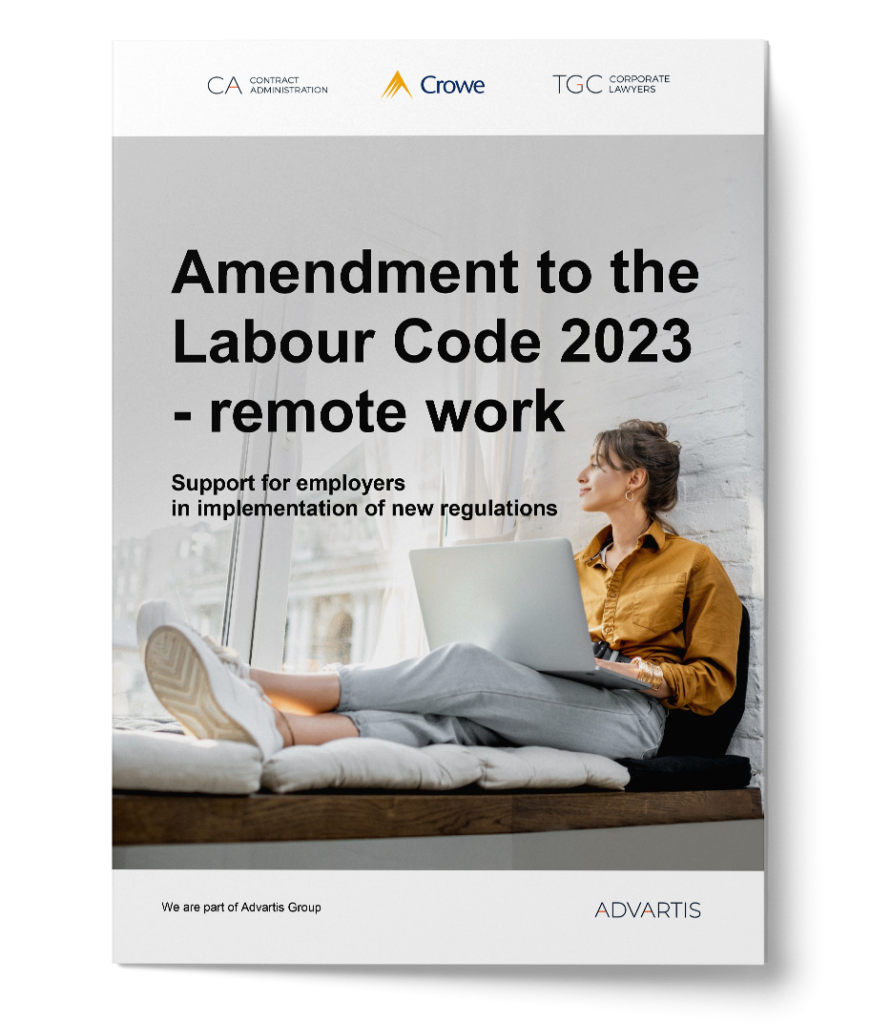
Amendment to the Labour Code signed. Remote work comes into effect
The amendment to the Labour Code adopted on 1 December 2022, was signed by the President. The new rules will regulate remote work and enable employers to control workers’ sobriety.
On 27 January 2023, the President signed the amendment to the Labour Code which contains two very important solutions for employers and employees:
- introduces remote work as a permanent form of work provision and at the same time repeals the existing regulations on the provision of work in connection with the COVID-19 pandemic and regulations on telework,
- it enables employers to carry out on-the-job checks on workers for the presence of alcohol in their organisms and for similarly acting substances.
Remote work in the Labour Code
The amendment to the regulations added chapter IIc on remote work to the second section of the Labour Code. According to the new regulations, remote work:
- is performed in whole or in part at a place designated by the employee and agreed with the employer, including at the employee’s place of residence, in particular by means of direct distance communication, or
- is performed at the employer’s instruction during the state of emergency, the state of epidemic threat or the state of epidemic and within 3 months after their cancellation or during the period when the employer is temporarily unable to ensure safe and hygienic working conditions in the existing workplace due to force majeure.
The act also specifies the scope of work not covered by remote work, such as particularly dangerous work.
The legislator also provided for the possibility of performing remote work on an occasional basis at the employee’s request, not exceeding 24 days a year.
Remote work — new employers’ obligations
The act imposes new obligations on companies regarding remote work. The employer will be obliged to provide a remote work worker with work tools and materials, including technical equipment, necessary to perform remote work. The employer will also cover the costs of electricity and telecommunications services directly related to the performance of remote work.
The rules for performing remote work in a given employing entity will be determined in the agreement concluded between the employer and the company’s trade union organisation. In the absence of a trade union organisation, these rules will be stated in the Work Regulations, after consulting them with staff representatives.
Control of employee’s sobriety — new regulations
The amendment to the Labour Code also introduced the possibility of controlling the sobriety of employees. The control will verify the presence of alcohol or similarly acting substances in workers.
The condition for carrying out checks is to ensure the protection of life and health of workers or other persons or the protection of property. Moreover, the sobriety check must not affect the dignity or other personal rights of the employee and these rules must be complied with by the employer when checking the sobriety.
Sobriety checks at workplace will be carried out using methods that do not require laboratory testing by means of a device with a valid document confirming its calibration.
The manner, group or groups of workers subject to the sobriety check, a type of device used for the check, time and frequency of testing will be determined by the employer in the collective agreement or in the Work Regulations. If the employer is not covered by a collective agreement or is not obliged to establish the Work Regulations, these rules should be set out in a special notice.
The employer must inform employees about the introduction of the sobriety check no later than 2 weeks before the start of the check.
In addition, the act introduces analogous regulations concerning the control of employees for the presence of substances acting similarly to alcohol.
Find out more: Amendment of the Labour Code — control of employee’s sobriety
Changes to employees’ personal files
The new regulations will require employers not only to update their internal regulations, but also to update employee documentation.
Part B of the employee personal file will have to include information about remote work and sobriety control (only for employers who introduce such solutions in their organisations):
- An employee statement that he/she is familiar with the occupational risk assessment and health and safety rules on remote work;
- Confirmation that the staff member has been informed of the sobriety check and how it is carried out.
At the same time, a new category of personal file has been created — Part E, which will contain information on the sobriety check of the employee or checks on the presence of substances acting similarly to alcohol carried out by:
- the employer,
- a law enforcement body.
Remote work in the Labour Code — date of entry into force
The amended and signed act amending the Labour Code will enter into force 14 days after its publication in the Journal of Laws. The exception are the provisions on remote work and repealing the provisions on telework. These provisions will enter into force 2 months after their publication.
Remote work — how can we help?
Get ready for regulatory changes. Our experts can provide legal support in the implementation of remote work in the organisation. We will help you develop internal documentation that takes into account the employer obligation to cover the costs incurred by employees working remotely, such as:
- Rules of remote work together with accompanying documentation
- Agreement on remote work
- Remote work instruction template
- Model individual agreement to perform remote work
Download the brochure: Remote work
— support in implementing the new regulations
Remote work — see how we can help your company:
See also
TGC Corporate Lawyers
ul. Hrubieszowska 2
01-209 Warszawa
Polska
+48 22 295 33 00
contact@tgc.eu
NIP: 525-22-71-480, KRS: 0000167447,
REGON: 01551820200000. Sąd Rejonowy dla
m.st. Warszawy, XII Wydział Gospodarczy





